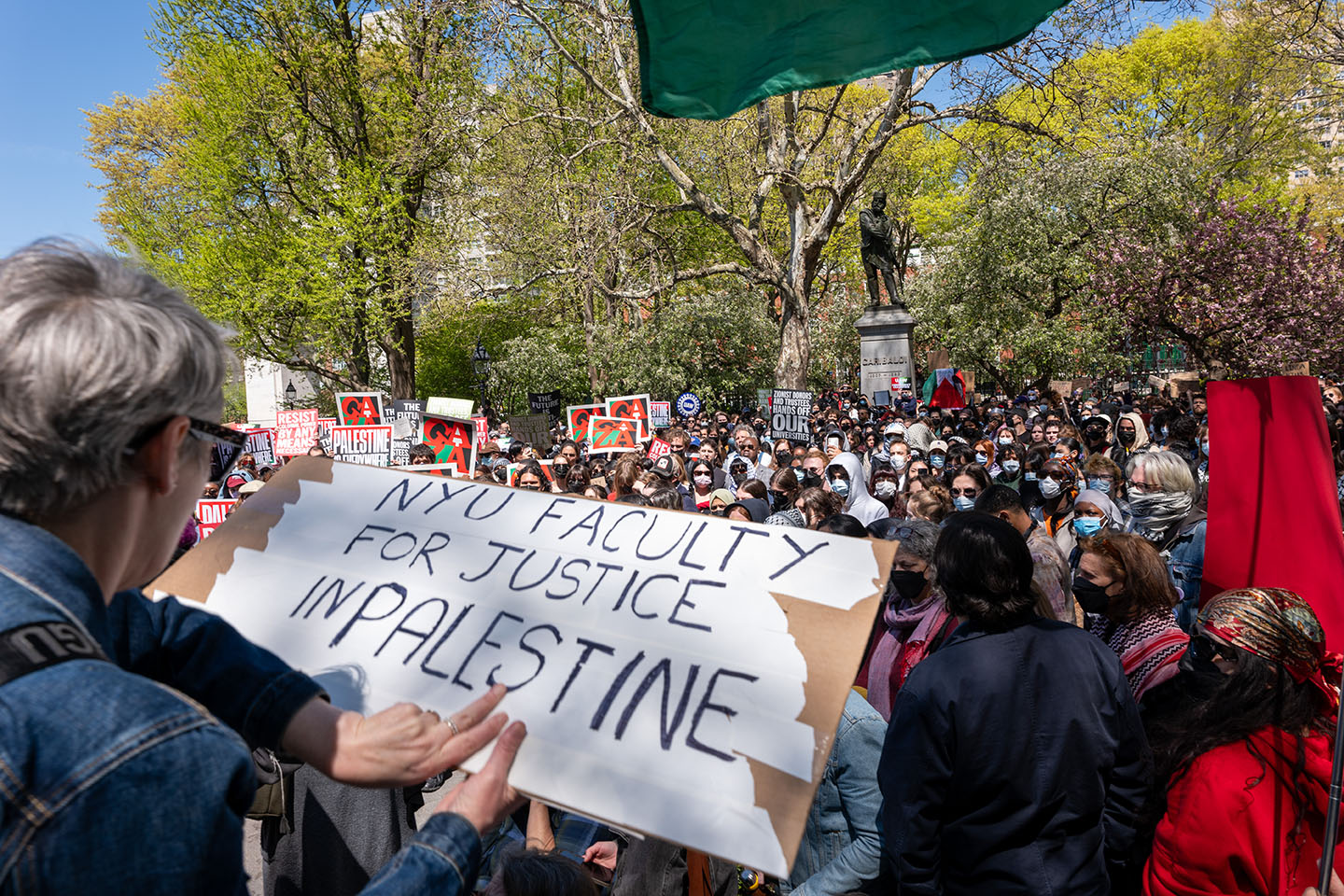In the wake of October 7, many American Jews have been forced to confront a bitter reality: The institutions they helped build and sustain—elite universities foremost among them—are now home to voices not just indifferent to Jewish pain, but also hostile to the very existence of the Jewish state. So what are we to make of a new Brandeis University study suggesting that hardly any faculty are hostile to Israel, or to Jews, despite clear evidence of a campus climate that feels profoundly unsafe for Jewish students?
The report, published by Brandeis’ Cohen Center for Modern Jewish Studies, surveyed roughly 2,200 faculty across nearly 150 U.S. colleges and universities. According to the researchers, only three percent of non-Jewish professors were “hostile” toward Israel, and just seven percent toward Jews. These are astonishingly low numbers, especially given that just last year, the same research center found that antisemitism on campus was “through the roof.”
In their 2024 report, Antisemitism on Campus: Understanding Hostility to Jews and Israel, the Cohen Center reported that 82 percent of Jewish students believe there are hostile attitudes toward Israel on their campus, and 60 percent believe the same about attitudes toward Jews. Even 33 percent of non-Jewish students perceived hostility toward Jews, and 56 percent saw it toward Israel. These findings, based on student experiences, tell a very different story from the faculty self-assessment.
So how can these numbers coexist? How can a campus climate feel so inhospitable to Jews and yet be populated by faculty who are, allegedly, overwhelmingly tolerant? The answer lies in the definitions and methodologies. According to the Brandeis researchers, only faculty who endorse all or most of a small subset of extreme statements are labeled “hostile.” But this threshold is far too high to be meaningful.
Consider just a few of the actual findings. More than half of the faculty in the sample—54 percent—agree that Israel is an apartheid state. Over one in 10 agree that Jews have too much power (11 percent). Nearly one in 10 (eight percent) would not want to collaborate with a scholar who supports Israel’s right to exist as a Jewish state. And seven percent believe Israel does not have the right to exist. Yet somehow, only three percent are coded as anti-Israel? This is all very suspect; it must be that more than three percent of the faculty are hostile.
Even more troubling is that none of these questions asked faculty if they support the Jewish state’s right to exist, reject academic boycotts, or speak out when Hamas is praised in student demonstrations. Absent such questions, the survey cannot detect the most prevalent forms of anti-Israel hostility: silence, equivocation, and selective outrage.
Social science research has long established that self-report surveys on sensitive political topics suffer from social desirability bias. People often give the answer they think is expected, not what they actually believe—especially in highly ideological environments like academia. Scholars like Timur Kuran have shown how preference falsification can skew public discourse and cloud the ability to detect real belief systems.
It is also crucial to note that many faculty behaviors—the very ones that shape campus climate—are not captured in attitude surveys. The language they use in class, the speakers they invite, the reading lists they curate, the petitions they sign, and the way they respond to controversy all have far greater influence on students’ daily experience than how they check a box on a questionnaire. The Brandeis report does not account for any of this. It invites readers to look away from the real-world manifestations of ideology and instead rest easy with abstract categories that soften reality.
But let’s set aside survey limitations for a moment. Suppose most professors sincerely believe they are not hostile to Israel or Jews. Then the more important question becomes: What do they actually do to support Jewish students?
Do they condemn Hamas when it massacres civilians? Do they speak out when campus protests glorify terrorism and chant for the destruction of the Jewish state? Do they sign letters denouncing antisemitic slogans? Or do they remain silent, even complicit, as Jewish students are harassed, excluded from coalitions, or pressured to renounce their views?
Behavior, not self-perception, is what matters. Yet the Brandeis report makes no attempt to cross-reference attitudes with actions. Did respondents participate in departmental statements after Oct. 7? If so, what did those statements say? Do they assign readings that include multiple perspectives, or only those framing Israel as a colonial oppressor? Do they encourage Jewish students to speak openly, or subtly discourage dissent from prevailing campus orthodoxy?
These omissions are not trivial and undermine the validity of the entire survey. Faculty who say they are not hostile to Israel but who validate false accusations of genocide or remain silent as Jewish students are shouted down are not neutral. They are enabling a climate of fear and alienation.
Faculty who say they are not hostile to Israel but who validate false accusations of genocide or remain silent as Jewish students are shouted down are not neutral.
There is a common adage in sociology: When behavior and self-report diverge, believe the behavior. By that standard, the Brandeis led faculty survey offers a comforting illusion. It tells us that most professors are moderate, tolerant, and open-minded. Maybe some are. But too many equivocate when clarity is needed, and accommodate extremism under the guise of academic freedom.
As Arthur Brooks often notes, true pluralism requires not just civility but also courage—the courage to stand up for those being marginalized, even when it’s unpopular. Jewish students and faculty are not experiencing hostility in theory; they are experiencing it in practice. They are being asked to check their identity at the classroom door, or to navigate their academic lives with the quiet anxiety of those who know they are one step away from being labeled.
Some Jewish students have begun to withdraw from campus life altogether, choosing to remain quiet in classrooms, opting out of student groups, or finding solace only in Jewish spaces. Others continue to speak up—at personal and academic cost. But the damage is already done when these students must calculate, every day, whether the expression of their identity or the defense of Israel will lead to their social and intellectual isolation.
The test of institutional character is not what faculty say in anonymous surveys. It’s what they say and do in public. And on that score, the academy has a long way to go. Like any process of teshuva—repentance and moral repair—reforming the campus begins with honest accounting. That requires recognizing the uncomfortable truth: large numbers of students and faculty hold anti-Israel views, and a smaller but meaningful number express overt hostility toward Jews.
Minimizing that reality through methodologically narrow surveys does no service to the pursuit of truth. And it does real damage to the cause of Jewish belonging and academic integrity. If we want campuses to live up to their mission of open inquiry and civil debate and authentic education that is based on viewpoint diversity and pluralism, the first step is to stop pretending that hostility isn’t there. The second is to act like it matters.
Samuel J. Abrams is a professor of politics at Sarah Lawrence College and a senior fellow at the American Enterprise Institute




